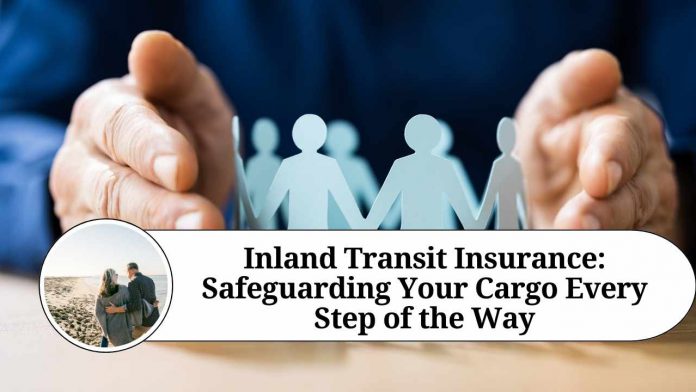Introduction:
When it comes to transporting goods, whether by road, rail, or inland waterways, there are inherent risks involved. Accidents, theft, natural disasters, and unforeseen events can all lead to damage or loss of cargo during transit. That’s where inland transit insurance comes into play. In this blog post, we will explore the significance of inland transit insurance and why it is essential for businesses involved in the transportation of goods.
Understanding Inland Transit Insurance:
Inland transit insurance, also known as goods in transit insurance, is a type of coverage that protects cargo while it is being transported within a country’s borders. It provides financial compensation to the insured party for any loss or damage that may occur during transit. This insurance can be tailored to meet the specific needs of various modes of transportation, including road, rail, and inland waterways.
Importance of Inland Transit Insurance:
- Mitigating Financial Loss: Inland transit insurance serves as a safety net for businesses involved in the transportation of goods. It provides financial protection against potential losses arising from accidents, theft, or damage during transit. Without insurance coverage, businesses may face significant financial burdens if their cargo is lost or damaged.
- Comprehensive Coverage: Inland transit insurance policies can be designed to cover a wide range of risks. These may include loss or damage due to accidents, fire, theft, natural disasters, acts of terrorism, and other unforeseen events. The comprehensive nature of the coverage ensures that businesses are protected against various potential risks, providing peace of mind.
- Legal Requirements: In many countries, having inland transit insurance is a legal requirement for businesses involved in the transportation of goods. Regulatory authorities often mandate this insurance to ensure that businesses can adequately compensate third parties for any loss or damage caused during transit. Failing to comply with these requirements can result in penalties or even the suspension of operations.
- Client and Supplier Confidence: Having inland transit insurance in place enhances the credibility and reliability of businesses in the eyes of their clients and suppliers. It demonstrates that the business takes responsibility for the safe transportation of goods and is prepared to handle any unforeseen circumstances. This can help strengthen relationships with clients and suppliers and provide a competitive edge in the market.
- Risk Management: Inland transit insurance is a vital component of an overall risk management strategy for businesses involved in the transportation of goods. By transferring the risk of cargo loss or damage to an insurance provider, businesses can focus on their core operations and have peace of mind knowing that they are protected financially in case of any unfortunate incidents.
Conclusion:
Inland transit insurance plays a crucial role in safeguarding the interests of businesses involved in the transportation of goods. By providing financial compensation for loss or damage during transit, this insurance coverage mitigates risks, ensures legal compliance, and enhances the credibility of businesses. It is an essential investment for any company that relies on the safe and timely delivery of goods to its customers. So, if you haven’t already, consider obtaining inland transit insurance to protect your cargo every step of the way.
Other Related Blogs: Section 144B Income Tax Act
Frequently Asked Questions (FAQs)
Q.What is inland transit insurance?
Inland transit insurance is a type of coverage that protects goods while they are being transported within a country’s borders. It provides compensation for loss or damage that may occur during transit.
Q.What does inland transit insurance cover?
Inland transit insurance covers various risks, including accidents, theft, fire, natural disasters, and acts of terrorism, that may result in the loss or damage of cargo during transportation.
Q.Who needs inland transit insurance?
Any business involved in the transportation of goods, including manufacturers, distributors, wholesalers, and retailers, can benefit from having inland transit insurance. It provides financial protection against potential losses during transit.
Q.Is inland transit insurance mandatory?
In many countries, inland transit insurance is mandatory for businesses involved in transporting goods. Regulatory authorities require this insurance to ensure that businesses can compensate third parties for any loss or damage caused during transit.
Q.How is the premium for inland transit insurance determined?
The premium for inland transit insurance is determined based on various factors, including the nature of the cargo, the mode of transportation, the value of the goods, the distance of transportation, and the insured party’s claims history.
Q.Does inland transit insurance cover international shipments?
Inland transit insurance typically covers cargo transported within a country’s borders. For international shipments, separate marine cargo insurance is required to cover goods transported by sea or air.
Q.Can I customize my inland transit insurance policy?
Yes, inland transit insurance policies can be customized to meet the specific needs of businesses. You can choose the coverage limits, deductible amounts, and additional coverage options based on your requirements.
Q.What should I do if my cargo is damaged during transit?
In the event of cargo damage, you should immediately notify your insurance provider and provide all necessary documentation, including photographs, reports, and invoices. Your insurance company will guide you through the claims process.
Q.Can I add additional coverage to my inland transit insurance policy?
Yes, you can often add additional coverage options to your inland transit insurance policy. These may include coverage for consequential losses, delay in delivery, and goods in temporary storage.
Q.How can I find a reliable inland transit insurance provider?
To find a reliable inland transit insurance provider, you can research and compare different insurance companies. Consider their reputation, financial stability, coverage options, customer reviews, and claims settlement process to make an informed decision.




















